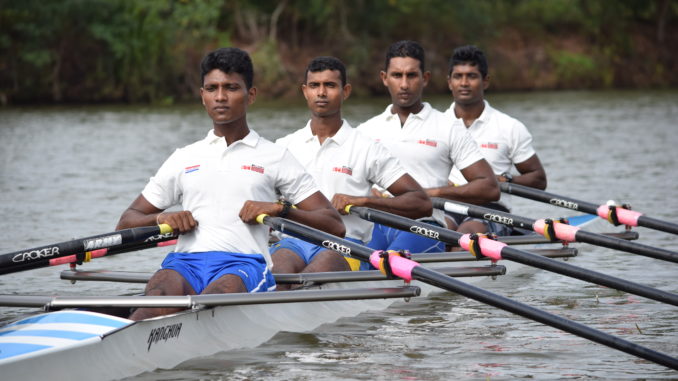
COLOMBO, July 12, 2018: Sri Lanka will pin its medal hopes in rowing at the Asian Games on a potent blend of Armed Forces magicwith two aircraftmen and two soldiers being picked for the grueling 2000 metresquadruple sculls event at the August 18-September 2 showpiece in Jakarta and Palembang.
Sri Lanka Air Force leading aircraftmen Budhika Chaturanga and Tharanga Rupasinghe, and Sri Lanka Army lance corporals Sugath Senarathne and UdaraUdawaththa were selected on recent performances as well as after a lengthy selection process.
It will be the first time in 12 years that Sri Lanka will send a quadruple sculls team to the Asian Games. On the last occasion Sri Lanka was represented in rowing at this multi-sport extravaganza was at the 2010 Guangzhou Games in single sculls. Hopes are high of a medal this time around, based on last September’s Asian Championships in Pattaya, Thailand.
“We set up a national pool of 40 athletes early last year and sent our best 12 to the Asian Championships in Pattaya where we performed very well with three boats reaching the A-finals and two boats in the B-finals. Following this event, we held our own National Championships in April this year (brought forward from September due to the Asian Games) and then worked on combinations from the 18 gold medalists. These four are our best combination and are a fairly good chance for a medal,” DimuthGunawardena, Hony Secretary of the Amateur Rowing Association of Sri Lanka revealed.
In rowing, as six lanes are used traditionally for racing, only the top six boats from the two semi-final rounds reach the A-final while the bottom six are relegated to the B-final and fight for 7-12th places in classification.
The training lasted two months followed by two weeks of trials. At one trial, the quadruple scull of Chaturanga, Rupasinghe, Senerathne and Udwaththa had recorded a best time which was one second outside the gold medal time at the 2014 Incheon Asian Games raising hopes within local circles of a medal at the Jakabaring Sport City Lake in Palembang.
“If we were to compare the times at the 2014 Asian Games, the gold medal winning effort was six minutes and 11 seconds, the silver was 6.18 and bronze 6.19. Our crew touched 6.12 in training which is quite promising. But we can’t get too carried away and will have to strive to improve on these timings,” Gunawardena stressed.
Gunawardena is cautious because he is fully aware that standards have improved across Asia since the last Asian Games. To get a more accurate picture, local rowing officials looked at the average timings at the last two Asian Rowing Championships and found out that the bronze medal timing had been lowered to 6.08, four seconds better than the effort by the Forces crew recently.
“But we are confident that our crew can also improve on their timing on 6.12. We ae within touching distance of a bronze medal going on the timings at the last Asian Championships and we are cautiously optimistic of being in the fray,” Gunawardena said.
The sport has been boosted with the commissioning of the Diyawanna Rowing Centre with the rowing canal at Waters Edge being expanded six years ago to international specifications. In the past rowers had to use the Beira Lake facilities which was well short of international standards – around 1.6 kilometres instead of 2000 metres.
“We are very grateful for the Diyawanna facilities. At the Beira, there is a straight line of about 1000 metres before there is a bend in the course which is also short by international standards. This was not ideal. But now we have a purpose-built rowing centre which is up to international specifications and is used by around 600 oarsmen and oarswomen for training and competition,” Gunawardena outlined.
In 2014, the government had allocated funds from its sports development budget to construct boatyards, a headquarters for the Association and other facilities. This had also been augmented by funds from the IOC’s Olympic Solidarity programmeand facilitated by the National Olympic Committee of Sri Lanka. The next stage of development a viewing gallery, restaurant and gymnasium are being planned for.
“Once fully developed, we can host international regattas as proposed by the world rowing bodyFISA as well as the Asian Rowing Federation,” Gunwardena added.
If a medal is won by the local quadruple sculls next month at the Asian Games, it can only hasten the entire process.

Be the first to comment